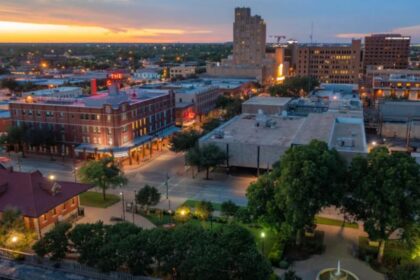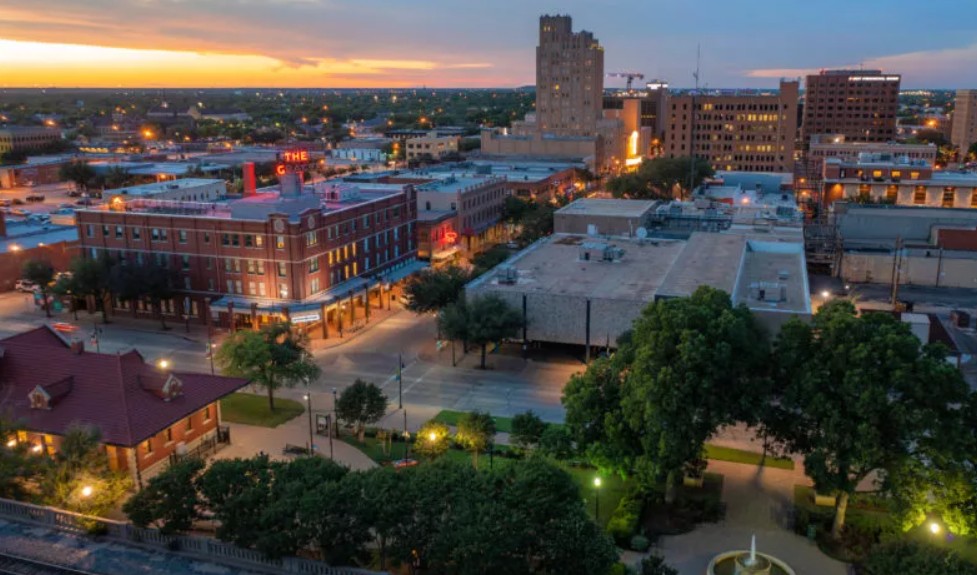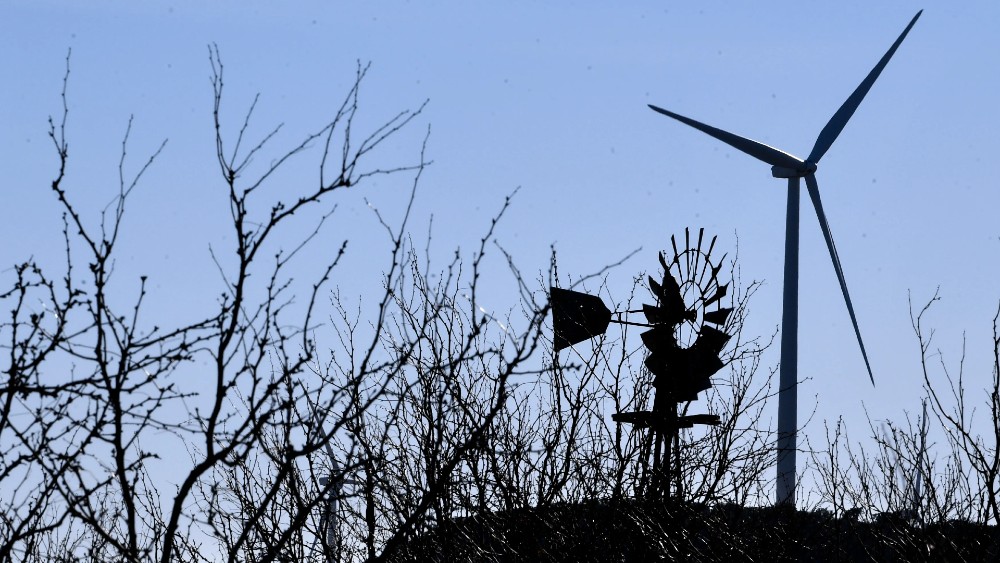
Abilene, Texas, on the surface, might seem like the set of Fallout where a now-restored Texas Film Industry needs a set for a post-apocalyptic Western — a flat, dusty military town with a church on every corner and a Dairy Queen next to it. Scratch that desert veneer (and lack of nuclear fallout) and you’ll find one of the strangest, most strategically poised places in the U.S. for the emergence of a true startup ecosystem, not just a small business hub. In fact, Abilene might be characterized by Fallout, where people are emerging from the shadows cast by the silos of Austin and Dallas, to invent new ways of surviving in the modern world.
Let me explain why I think Abilene, Texas shares many of the opportunities that I just shared of Tulsa, OK; because a startup ecosystem requires risk-taking, paradigm-breaking entrepreneurs, and resources willing and actively supporting the endeavors underway.
With my home in Texas, I can’t help but want to explore for you, wherever you are, how regions of a state as large as this (or perhaps a region or country such as yours), can distinguish itself to be more meaningful to startups.
Article Highlights
- 1. Military Infrastructure with Venture-Grade Talent Potential
- 2. Cultural Conservatism That Breeds Contrarians
- 3. Higher Education Without the Tech Echo Chamber
- 4. Affordable, Available, and Build-Ready
- 5. The Abilene Paradox… and Why Abilene Proves it Wrong
- 6. Texas Policy Tailwinds and a Void to Fill
- Now, WHY Abilene?
- Welcome to the “Grit Grid”
1. Military Infrastructure with Venture-Grade Talent Potential
You don’t build a startup ecosystem by handing out Chamber of Commerce brochures and reminding people they have “plenty of parking.” You build it on the back of people who are disciplined, adaptive, and mission-driven. Enter Dyess Air Force Base.
Abilene is home to a large US Air Force installation with a diverse set of missions and with it comes an exportable population of skilled personnel; trained in logistics, cybersecurity, aviation technology, operations, and, importantly, leadership under pressure.
You want founders who can handle risk and pivot when a plan fails? You want veterans.
Vets aren’t just America’s underutilized founders-in-waiting, they’re disproportionately successful entrepreneurs. And if I can be harsh for a second, while Governments double-down on University systems and programs as the pipeline of R&D and entrepreneurship, they drastically overlook that service members are accomplishing it; according to the SBA, veterans are 45% more likely to be self-employed. They’ve been trained to solve problems with limited resources and uncertain timelines. That is startupland.
2. Cultural Conservatism That Breeds Contrarians
While everyone is busy building echo chambers in Brooklyn or shouting into the digital void in Austin (yes, me included), Abilene is something of a sociopolitical pressure cooker. That makes it ripe for disruptive innovation, especially in Texas’ sociopolitical pressure cooker which itself is a tug-of-war of political values, party lines, and moral extremes.
Startups emerge in places where conventional thinking is so dominant that questioning the norm becomes revolutionary. This isn’t an opinion, it’s a studied fact: Silicon Valley was born of the collision of military innovation with Haight-Ashbury hippies and Vietnam protesters while evidence in Texas, Austin stands out because of its contrarian view to conservative Texas. Thus, in a city steeped in conservatism, religion, and tradition, the outsider or the non-conformer doesn’t just make noise, they’re forced to justify, to test, to prove. That’s the crucible in which real innovation survives.
Think of Abilene as a market testing lab: if it works here, if it catches fire here, where social and institutional inertia resist change… it’ll work anywhere.
3. Higher Education Without the Tech Echo Chamber
While my first point criticized Universities, hopefully you know from reading me from time to time that I judge and criticize because entrepreneurs REQUIRES that we think differently… So I criticized them to reinforce the military implication there. Now, let me throw them back in the pressure cooker as value.
Most cities with universities are crammed with over-inflated egos and under-delivering incubators. Abilene’s three universities — Abilene Christian University (ACU), Hardin-Simmons University, and McMurry University — are under the radar but packed with students with a moral compass, a work ethic, and no illusions about a free ride in Silicon Valley.
ACU in particular is worth watching: it’s private, it’s tech-forward (notably early in mobile technology integration), and has a history of experimenting with media, blockchain, and digital platforms as part of its internal transformation. Students here aren’t already picked off by FAANG recruiters. They’re waiting for the opportunity to work on something meaningful. And that isn’t “Tech Companies,” it’s startups.
4. Affordable, Available, and Build-Ready
Want to know the real secret to startup ecosystems? It’s not money. It’s slack: excess capacity in real estate, labor, mobility, time, and attention. Abilene has all five.
Office space, land, housing, it’s all there, and unlike booming metros, it’s not hostile to newcomers or limited to real estate speculators. That slack means risk-taking is affordable. Startups can fail gracefully and try again, without being evicted or priced out of existence.
Many cities throughout the world hail that they are less expensive (cheaper) than New York or Silicon Valley. Austin used to do it too, proclaiming that being less expensive is better for startups. That’s NOT correct and it’s horrifically misleading – what we’re searching for is affordability. A city failing to provide affordability is a city struggling; people can certainly live and work in Manhattan if they can afford to be there.

Abilene offers an urban grid with good bones; walkable downtown, underutilized commercial properties, drivable access, and a city council that isn’t ten layers of bureaucracy deep. If you need to test a new hardware product, launch a new kind of delivery system, or prototype a direct-to-consumer logistics model, there are few places in the U.S. that give you more leeway and affordable opportunities to try.
5. The Abilene Paradox… and Why Abilene Proves it Wrong
Ironically, the town that inspired the Abilene Paradox — an infamous groupthink model where everyone agrees to do something nobody wants — has the cultural capacity to beat it.
And that creates a regional identity that is intriguing, fun, drawn from history, and, coincidentally, very relevant to entrepreneurship and startups.
How? By recognizing it. Abilene’s own folklore about bad consensus decisions is a lesson embedded in its DNA. A startup community can emerge there precisely because the locals know what it means to go along with the crowd, and they’re getting tired of it.
The risk isn’t in being contrarian; it’s in being compliant.
This is fertile ground for a movement of founders who don’t fit the Silicon Valley mold and don’t care to. Founders who want to solve real problems in energy, agriculture, logistics, healthcare; things rural America actually understands.
Hell, I’d open an Innovation Space (not a coworking space or accelerator! A venture studio) called Abilene Paradox, and own it… you’re not welcome here unless you disagree with us.
The Abilene Paradox, a psychological phenomenon, describes a situation where a group collectively agrees on a course of action that none of them actually want, due to a fear of voicing their true opinions. It was coined by management expert Jerry B. Harvey and named after a real-life anecdote about his family’s uncomfortable trip to Abilene, Texas, where they all agreed to go even though none of them initially desired to. The paradox highlights how flawed communication, and a lack of open dialogue can lead to decisions that ultimately harm or dissatisfy everyone involved.
6. Texas Policy Tailwinds and a Void to Fill
And why can Abilene prove that its own paradox is wrong? Because people do want to be there, because it’s not the same.
Abilene isn’t Austin. It isn’t San Antonio. The big cities in Texas are increasingly crowded out by rent-seekers and corporate tourists. Abilene could be the next Lubbock; closer to the big cities on the east, where we build startups that thrive on real-world constraints.
Texas itself is already a magnet for venture capital, but it’s largely being misallocated to B2B SaaS me-toos in oversaturated markets. The real opportunity is in places like Abilene where founders can partner with the state on rural innovation, energy resilience, defense technology, and decentralized health and education services.
And let’s not forget Texas Tech‘s innovation system is only a couple hours up the road in Lubbock, Tarleton State University‘s College of Agriculture and Natural Resources is exceptional, and the I-20 corridor is increasingly a corridor of influence, not isolation.
Abilene opportunity lies in being radically different because that’s the defining quality of an entrepreneur and it’s the purpose of a startup. In fusing military grit, moral clarity, rural slack, and a chip-on-the-shoulder ethos into something uniquely qualified to birth the next kind of startup ecosystem — one built not on hype, but on purpose.
Now, WHY Abilene?
“The spirit of Abilene is a unique combination of determination, generosity, collaboration, and friendliness. It’s always been a place where big ideas could take root and flourish, whether it’s raising the money to establish an Air Force base in the 1950s, becoming the Storybook Capital of America in the 2015, or serving as the launchpad for Stargate today,” noted Abilene Ecosystem Entrepreneur Michael Bob Starr. “It’s why I chose to make Abilene my home, and why our most exciting days are still ahead of us!”
Look at what’s under the ground, under the radar, and underappreciated by those who still think a pivot is a fancy business term and not something you do when the wind changes on the plains.
Abilene’s Economic Bedrock: Literally
Water Access in a Dry World
Let’s start with something sexy: water rights.
While the rest of the western U.S. is in a death match with drought and climate volatility, Abilene has been smart. With reservoirs like Lake Fort Phantom Hill, Hubbard Creek Reservoir, and Lake Abilene, this town is one of the most water-secure regions in a state notorious for water wars. That’s not just good for agriculture, it’s good for anything that needs water to scale: precision fermentation, data centers, climate-resilient food production, and biomanufacturing.
You want to build the next vertical farming unicorn or energy-intensive compute farm? You’ll need power (more on that in a minute) and water. Abilene has both, and you don’t have to arm-wrestle seven cities for it.
Wind Energy Central, Literally
Look at a wind energy map of Texas. Now look closer. That vortex of turbines? West Central Texas. Abilene sits right in the heart of one of the largest wind energy corridors in the Western Hemisphere.
That’s not just an economic driver; it’s an infrastructure opportunity. Companies in energy tech, battery storage, hydrogen production, grid balancing, and energy arbitrage have a goldmine here; not because you can build the grid, but because you can solve the grid. You’re at the junction where intermittent power meets massive opportunity.
Abilene is already home to wind farms with some of the highest capacity factors in the country. And now solar is stacking up, along with conversations around green hydrogen hubs and carbon capture projects.
Energy transition startups: this is active buildout, where capital resources and industry experience ALREADY exists and understands what you’re doing; and it needs the very kind of early-stage innovation that big utilities don’t create in-house.
Geological Stability: An Underappreciated Asset
This means data centers and infrastructure: Abilene’s location puts it on solid ground. Texas may shake politically, but geologically, this part of the state is among the most stable. Unlike the Gulf Coast or West Texas oil fields where subsidence and fracking tremors are real issues, Abilene sits on the Eastern Shelf of the Permian Basin, offering geological reliability without the industrial volatility.

Why does that matter? Because if you’re building capital-intensive projects, say a crypto-mining rig, an AI training farm, or an agricultural robotics testbed, you want infrastructure that doesn’t crack under pressure. You want long-term viability. You want Abilene, west enough in Texas that it isn’t subject to the weather, geography, and property constraints of the cities to the east.
Again, I’m not proposing, I’m pointing it out; the recently announced Abilene data center is a large-scale AI data center being built in Abilene, Texas, primarily for Stargate, a project developed by OpenAI and Oracle. This project is part of a larger initiative to build AI infrastructure on a massive scale.
Traditional Industry, Reinvented
Agriculture, But Make It Smart
Yes, Abilene is surrounded by farms. And these days, that’s not a relic of the past, a bread belt feeding the country, nor cowboys herding cattle — it’s a proving ground for the future.
Texas produces more cattle than any state in the country (okay, so there are cowboys herding cattle). The region around Abilene is a mix of cattle ranching, cotton farming, and sorghum production, with diversified ag operations that stretch from family farms to co-ops and commercial exporters. That creates enormous potential for agtech, supply chain optimization, food traceability, robotics, and IoT for land and livestock management.
And because these industries have been operating for decades, there’s an established logistics and distribution backbone: railroads, intermodal freight access, and short-haul trucking routes (where by the way, the Texas-first initiative to have autonomous semis hauling freight on freeways, puts demand for that too, right here), that a startup can plug into immediately without building from scratch.
Want to build a soil sensor company? A predictive weather AI? A biotech firm using agricultural byproducts for new materials? You can test, iterate, and scale faster here than anywhere in the U.S. because the market is literally five minutes outside your door.
Oilfield Adjacent: Services, Not Spills
Though it’s not Midland, Abilene still taps into the service economy of the Permian Basin. That means it has machine shops, fabrication facilities, oilfield service talent, and materials suppliers that know how to build fast, scale hard, and survive crashes. That talent has been solving real problems for years and as east Texas brought the digital transformation of traditional industry out of Silicon Valley, West Texas takes us into the future by applying robotics, automation, additive manufacturing, field service software, or predictive maintenance, and new infrastructure to sectors that will never be replaced by AI.
You’re talking about a workforce that knows how to weld, wire, fix, and finish — the SBA’s “New Collar Jobs” epicenter, where we reinvent the trades and education to create the workforce that will forever be relevant.
Geography That Matters in the 21st Century
Strategic Logistics and Defense Corridors
Remember Dyess AFB? It’s not just a source of talent; it’s a logistical and strategic asset. Abilene is directly tied into federal defense infrastructure, and that means early access to government contracts, SBIR funding, and tech transfer opportunities.
Startups working in dual-use technology, defense-adjacent AI, cybersecurity, drones, wearables, or training simulations have a direct path here to piloting and procurement—without the red tape of D.C. or the East Coast defense mafia.
Still, Why Abilene?
Abilene, Texas isn’t a blank canvas; it’s cities that are blank canvases that tend to fail as startup ecosystems, because they embrace trying to be all-things startup, a “tech” hub, or the Next Silicion Valley. You don’t want to be the next Second Rate; you want to be the ideal for… And Abilene is a primed, quietly humming engine, with natural resources, industrial heritage, geographic advantages, and policy alignment that make it dangerously underrated as a startup ecosystem.
- It has renewable energy infrastructure looking for innovation.
- It has agriculture and food supply chains hungry for modernization.
- It has defense and logistics corridors ready to support pilot programs.
- It has land, water, and workforce advantages that are sustainable and scalable.
- It has real estate and civic slack that lowers the cost of failure—and raises the odds of resilience.
Welcome to the “Grit Grid”
It’s not a valley nor Silicon Hills. It’s the grid, for energy, for logistics, for technology, and for minds that refuse to go along with the crowd just because everyone else is.
The Grit Grid is the identity Abilene has earned but never marketed. It’s the name that says: this is where hard things are built by people who know how to build, on land that has powered nations, fed millions, and now runs the machines that will define the next century.
It’s a nod to:
- Grit: The relentless drive of veterans, engineers, ranchers, machinists, and founders who work in sun, wind, sweat, and silence, far from the hype cycles and clickbait.
- Grid: The energy infrastructure that defines the region, wind turbines, solar arrays, substations, and AI-ready data centers, running across a literal grid of power, freight, land, and fiber.
Angela Duckworth, author of GRIT, The Power of Passion and Perseverance, “Grit is passion and perseverance for very long-term goals. Grit is having stamina. Grit is sticking with your future, day in, day out, not just for the week, not just for the month, but for years, and working really hard to make that future a reality. Grit is living life like it’s a marathon, not a sprint.”
Grit is a metaphor for the mental and social grid that Abilene defies. The Abilene Paradox — everyone nodding along because no one wants to dissent — dies here. Because here, they don’t gridlock; they grid-build.
- It’s geologically grounded. It connects directly to the region’s advantages in the literal power grid (ERCOT’s footprint), the wind corridor, and the reliable geological basin.
- It’s psychologically rebellious. It names and rejects the Abilene Paradox. It’s not just a phrase—it’s a dare: don’t come here unless you’ve got grit and you’re willing to break the mold.
- It’s economically descriptive. The Grit Grid region produces power, food, freight, and defense infrastructure. These are the foundational systems of modern civilization. If Silicon Valley built our digital layer, this is where we upgrade the physical one.
- It’s culturally resonant. Texans love a good brand. From Hill Country to the Permian Basin, every part of Texas knows its name. But none capture Abilene’s unique role in the 21st century better than Grit Grid — a name that could sit just as well on a tech conference as it could on a ranch gate.
How does Reality Become Opportunity Through Abilene?
1. Create a Venture Studio, Not Another Coworking Space.
Abilene needs a founder-first venture studio that builds companies from within, not a rent-a-desk echo chamber, for teams only solving “grid” and infrastructure-relevant problems.
2. Reclaim and Reinvent the Abilene Paradox.
Turn the paradox on its head: host contrarian salons, rebel pitch nights, and failure storytelling events. Make it culturally expected to dissent and experiment, not comply and conform.
3. Convert Military Exit Pipelines into Startup Pipelines.
Partner with Dyess AFB to create a transition program where existing veterans get matched with startup roles, technical co-founder gigs, or capital to launch their own ventures. Own the grit and the paradox – these aren’t solutions to typical DoD initiatives, they’re where entrepreneurs are willing to show the Defense Industry why they’re wrong, and they can prove it.
4. Align Universities with Founders, Not Institutions.
Incentivize ACU, Hardin-Simmons, and McMurry to fund student-led startups, not just research, and not just what every other University pretends to offer. Create cross-campus EIRs (entrepreneurs-in-residence) to integrate bedrock, traditional, and military talent in innovation.
5. Establish, by demanding of investors, a Regional Fund Backed by Real Assets.
A fund tied to land, energy, logistics, and water rights — Abilene’s unique assets — should back companies that build with the region.
6. Aggressively Recruit Founders from Burned-Out Cities.
Target founders fleeing cost, congestion, or conformity — offer a “Startup Homestead Act”: land, housing, and mentorship to build in the Grid. Go after them with a pitch, not just a billboard, and target those with Grit, not wantrepreneurs.
7. Cut Through Bureaucracy Like You’re Sharpening Fence Wire.
Streamline permitting, zoning, and incentives for experimental and capital-intensive startups: agtech, energy, robotics, defense. Make city staff work like startup operators, not municipal clerks.
8. Claim a Statewide Niche in Defense-Tech and Dual-Use Innovation.
Be the Texas testbed for defense-adjacent tech: drone corridors, wearable biosensors, hardened AI networks. Push for SBIR outreach and create partnerships with military-aligned VCs.
9. Build Physical Spaces That Feel More Like Labs Than Offices.
Turn abandoned infrastructure into labs, workshops, and test environments. Think less “open floor plans,” more “hangar meets hacker space.” This is blue-collar innovation country.
10. Own the Identity. Brand Loudly. Market Ruthlessly.
Stop waiting for recognition. Launch the Grit Grid brand. Put it on stage at SXSW or better, host the Grit Conference. Carve it into a wind turbine. Tattoo it on a goat. Make sure every Texan knows: this is where bedrocked startups are founded.
The ideal startup cities don’t TRY to be tech hubs or startup ecosystems, they invest in supporting entrepreneurship and innovation in what it already is: Abilene – a city forged by discipline, grit, and pragmatism, sitting atop the literal and figurative infrastructure of the next economy. Its military backbone, water and energy assets, and cultural resistance to conformity make it uniquely capable of birthing startups that don’t just scale apps, but solve real-world, industrial, agricultural, and national security problems.
The identity is already there, rooted in the soil, wind, and stubborn independence of its people. What Abilene needs now (what your city needs) isn’t transformation, but conviction: to lean into its contrarian nature, align its institutions with founders instead of bureaucracy, and build the Grit Grid not as a slogan, but as the physical and philosophical framework for a startup ecosystem built on purpose, not hype.




This is why I’m spending so much time going back and forth from West Texas now… lots happening in the Permian Basin!
Double tap on the need for hands on venture studios and LOVE the hat tip to “gritty, mission-driven students untouched by tech-world arrogance” Awesome take; I love betting on the Davids over the Goliaths
Erika Haskins Venture studio model will be key but I think VERY different in what’s next. Digging this post Paul O’Brien – you got great company here
Michael Bob Starr we should dive into a venture studio guide next. Katie Mehnert Erika Haskins, join us? I’ll draft it up. Contextually relevant, not just a venture studio, but as meaningful here (and explaining how/why be specific to your city)
Paul O’Brien Yeah, I’m in!
Let’s go Abilene Christian University! I’ll take gritty and mission driven any day. Wildcats for the win.
You forgot to mention: leading the way in nuclear salt reactors!
Riley Simpson I have a tendency to write long
so I always neglect some things when I’m rereading it and just think, “okay, I need to stop”
Paul O’Brien I just love the fervor for Abilene. Has an insanely high density of launching high impact people
Amit B. Courtney M. Queen, Ph.D. Doug McIntyre, Ph.D. Gary Forni Brad Benham Jeff Mustin, J.D., M.B.A.
Paul O’Brien You are preaching to the choir my friend. We believe! At the Central Texas Angel Network we believe in finding and supporting startups and investors throughout the state and nation. Michael Bob Starr is the Director of our Abilene Chapter. Abilene has all the ingredients and people to become a great startup city and we want to help make that happen.
Sumeet Trehan Katie Mehnert John Rowe Mason Mote Noah Fons FYI
Bobby Tudor this is an ex of what we will discuss when you come in September
I always felt the secret to building a tech community is to build a charming community.
Go all in on charm, culture, & community and the tech talent will follow. The mistake most of these communities make is that they try too hard to incentivize tech talent while ignoring this.
Maxine Cunningham #highereducation
Not sure why this never struck me sooner, but it’s not like anyone set out to make SV into SV. There was a lot of serendipity that went into that “success story.” The ol’ lightning in a bottle, if you will. Certainly, there was no “We need an MVP for this area” and that product market fit turned out to be startups.
That said, applying the concept of MVP to an area makes sense. But trying to use SV – or some other success story – as a blueprint to be copied? Probably much less so. Inspiration? Sure. But a cheap knock-off? Why?
https://www.power-and-beyond.com/the-story-of-silicon-valley-how-it-began-how-it-boomed-and-where-its-headed-a-9836fd8f0adf6d3535810e709d99fec3/
Mark Simchock It’s headed where lots of things that get hyped up go… down. Building the new order is about DIFFERENT — thanks for sharing this.
Great article, Paul, I particularly liked the line ‘you don’t build a startup ecosystem by handing out Chamber of Commerce brochures and reminding people they have ‘plenty of parking.’ Although more parking would certainly help here on the Sunshine Coast!
Thanks for sharing, Paul O’Brien – Love the way you think. The future isn’t about tweaking the past—it’s about rewriting the playbook entirely.
The industrial economy is dead, and survival demands reinvention.
For large cities to rise in this new world order, adaptation isn’t optional—it’s the mandate. Success now calls for systems thinkers, builders, and doers—leaders who deliver results and don’t flinch at complexity. Houston’s opportunity is massive, but the key lies in synergy with places like Abilene. The regions – are hotbeds for authentic, sustainable innovation.
The real game-changers are those who invest capital and energy in resilient, grounded ventures – the “different thinkers” not the people of the same copy paste stuff. Family offices, local trailblazers, and mission-driven visionaries are the backbone of this future—not VCs clutching yesterday’s playbook.
Abilene proves it—by combining raw talent, scalable infrastructure, and an education system forged with purpose, it’s driving real change. The future belongs to the builders who solve hard, unsexy problems, not to those propping up the status quo.
I’m in. Let’s connect — I’m building something big and would love to learn more from you!
Yes! Our partnership with the Central Texas Angel Network is vital to our efforts. And just like the value an angel investor provides to a startup, CTAN’s value to the Abilene startup ecosystem has little to do with access to capital. It’s about connection, education, and access to experience. I’m proud to be a CTAN member and grateful for the friendships I’ve found there!
Just another reason to relocate your scaling business to Texas- right on Paul O’Brien Perhaps Paul Abiline could be included into the Texas Quantem Corridor. I nominate Lubbock next and the great impact Texas Tech University is making.
Jay Hardaway This is the article we discussed this morning. Click the link to read the full piece.
This is a powerful and much-needed take on what truly fuels a startup ecosystem. The “Grit Grid” concept is brilliant—it’s about leveraging real assets and a resilient culture, not just copying a vibe. This is what’s needed for founders who are solving hard, real-world problems.
Invesho can be useful here by helping these founders, who might not fit the traditional mold, connect with the right investors who see value in grit over hype.